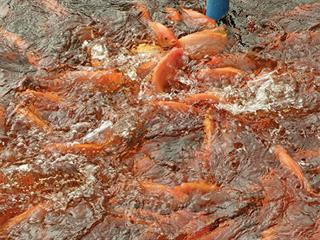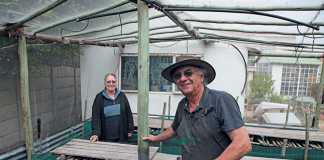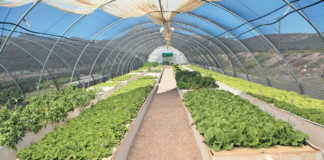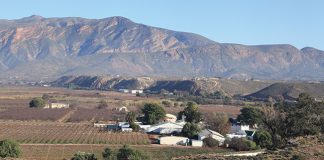
Aquaponics consultant and trainer Leslie Ter Morshuizen is a man with a mission. He has set out to prove that aquaponics – producing crops and fish in a self-contained system – can work in South Africa. And so far, he is highly optimistic. “Aquaponic production is practised viably where crop values are high, such as Australia and North America,” he says. “In South Africa, crop prices are currently high, so I’m excited about the future of aquaponics here.”
Extensive research
Ter Morshuizen travelled extensively to research aquaponic production techniques before erecting his 30m x 10m aquaponic tunnel system near Grahamstown in October last year. “I wanted to do it myself to quantify it and prove that aquaponics is commercially viable here,” he says. “An aquaponic production facility has never been tested commercially in South Africa before.”
Ter Morshuizen explains that during the past decade, aquaponics has attracted mostly hobbyists in this country. However, after almost a year of production from his aquaponic tunnels, he is convinced that the time has arrived for commercial producers to take aquaponics more seriously. He stresses the importance of selecting crops with the highest possible value for production in an aquaponic facility.

Leslie Ter Morshuizen in his aquaponic tunnel system near Grahamstown in the Eastern Cape.
“You need crops with a high value and turnover, which places you in the herb and vegetable market,” he explains. In his current system, for example, Ter Morshuizen has been able to produce 3kg of basil per grow bed per month. He calculates that if he were to focus on producing basil in all 40 grow beds, he would generate an income of R14 400 a month from basil at a price of R120/kg. Other crops he has selected include rocket, mint, lettuce, tomatoes and cucumbers.
Start-up costs
Ter Morshuizen explains that although his aquaponic tunnel system cost him R350 000 to erect, the running and maintenance costs are relatively low. Only one manager is needed, plants and fish are produced from the same fish feed, and the system requires only 1,62kW of electricity, excluding heating costs. A 3,3kW heat pump is installed, but this is used only in winter. Water usage is relatively low at 2 000l per week in summer and approximately half of that in winter. Little space is needed to erect a facility.
Recycling system
Water is pumped continuously through a recycling system – consisting of an automatic flood and drain cycle – which runs from the fish tanks through the plant grow beds. The plants remove the solid and dissolved waste – nitrate and phosphate, which are plant fertilisers but toxic to fish – before the ‘clean’ water is returned to the fish tanks. Ter Morshuizen explains that the correct management of such a system demands practical knowledge of aquaculture and hydroponic systems, and the way in which they are able to interact and complement each other within an aquaponics system.
“You’re dealing with fish and plants,” he stresses, “so you need a good working knowledge of both.“Ter Morshuizen breeds the tilapia (Oreochromis mossambicus) on site before introducing them into the aquaponics system at the age of one month. The fish are stocked at a density of 660 in each of the four 4 300l fish tanks. This ensures that adequate waste is produced to sustain the plants in the 2,8m2 grow beds.
The tilapia are harvested at a weight of 300g when they are approximately nine months old. Grow beds are filled with a gravel medium in which plants such as cucumbers and tomatoes can root themselves, even though they are trellised. Other plants, such as basil, are grown in floating polystyrene rafts through which their roots hang into the nutrient-rich water.
In addition to managing the balance between the production of fish waste and its effective absorption by plants, Ter Morshuizen ensures that the temperature in the tunnel is kept at an average of 30°C. This provides optimal conditions for the production of almost all crop varieties.The herbs and vegetables derive all their nutrients from the water originating from the fish tanks. Moreover, no pesticides are used, as that would compromise the safety of the fish. Insect infestations on plants, such as red spider, are controlled by organic means – a garlic/chili/khaki bush spray is most commonly used.

Some of the 40 productive grow beds in Leslie Ter Morshuizen’s aquaponic tunnel system near Grahamstown.
Superior quality produce
Ter Morshuizen insists that his organically produced herbs and vegetables have superior flavour and a longer shelf-life than those grown in a hydroponic system or in soil. “The flavour, texture and shelf life of crops coming out of the aquaponic system is phenomenal,” he says. “We’ve been blown away by the quality of the product.”
Close proximity to affluent market
Ter Morshuizen believes that aquaponic systems are best suited to peri-urban farmers in close proximity to large, stable markets. “It doesn’t help growing the crops and then trying to find somebody willing to buy them. You have to be near a big centre,” he says.Just as more importantly, these consumers should be affluent enough to be able to afford large quantities of premium organic produce.
Ter Morshuizen currently supplies retail outlets in Grahamstown with organic herbs and vegetables two to three times a week. The tilapia are sold either unprocessed on the informal market, or are gutted and gilled and sold on ice to restaurants. He also sells 100kg a month to a local fishmonger. Income from total fish sales is about R4 000 per month.
Now that he is satisfied this pilot project is commercially viable, Ter Morshuizen hopes to fine-tune the system, before returning to his career as a consultant and trainer of new entrants to the aquaponics industry.
Visit www.aquaponics.co.za or email: [email protected].













